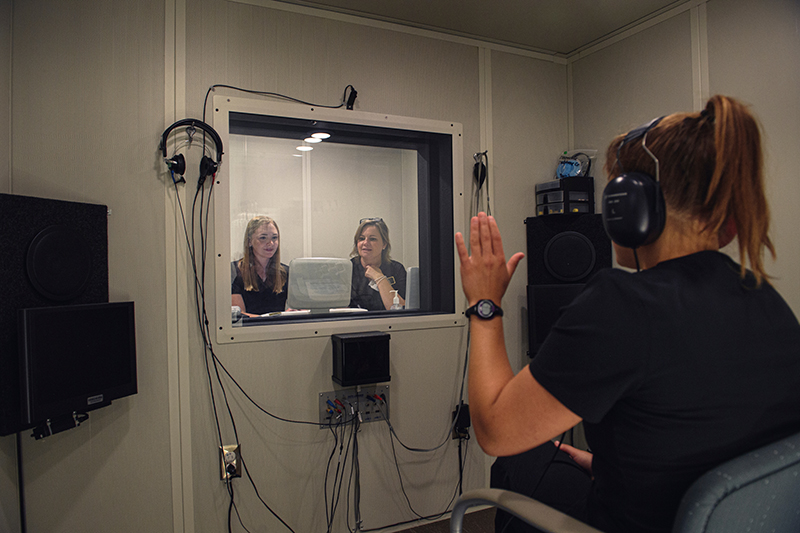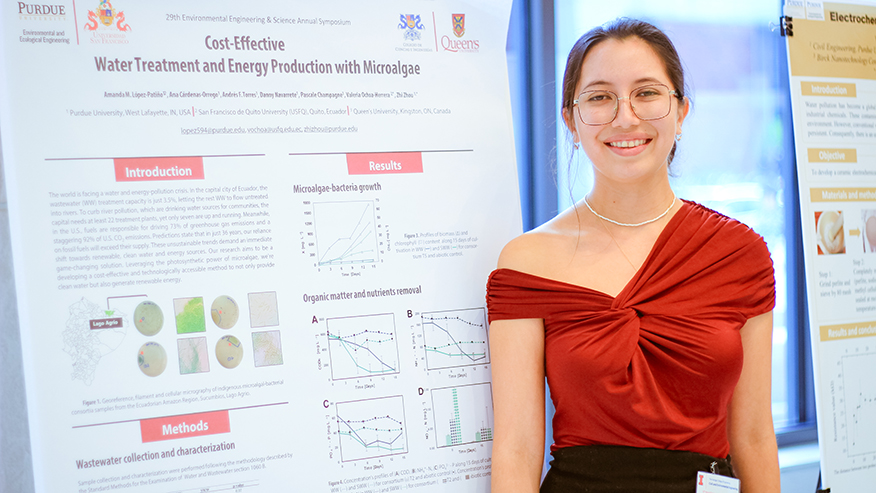Purdue’s audiology graduate program offers interdisciplinary approach to hearing, balance disorders

Students in Purdue’s clinical audiology graduate program, ranked No. 9 nationally by U.S. News and World Report and tops among its Indiana peers, gain a deep level of experience through the university’s Speech, Language, and Hearing Sciences’ audiology clinics, including performing hearing screenings. (Purdue University photo/Rebecca McElhoe)
About this series: This story is part of an ongoing Purdue Today series highlighting programs ranked in the Top 10 or Top 10th percentile among our peers nationally, demonstrating the university’s persistent pursuit of excellence, innovation and transformative learning.
Purdue’s audiology graduate program offers interdisciplinary approach to hearing, balance disorders
Roughly 37.5 million adults in the United States report some trouble hearing, the National Institutes of Health says. As hearing loss becomes increasingly prevalent, the audiology graduate program in Purdue’s Department of Speech, Language, and Hearing Sciences is preparing clinicians who are ready to meet the challenge.
A four-year doctoral degree, Purdue’s clinical audiology graduate program is ranked No. 9 nationally by U.S. News and World Report and is tops among its Indiana peers, offering students a blend of academic rigor, clinical education and research opportunities.
“Consistently ranked as one of the best in the country, our Doctor of Audiology (AuD) program gives students a deep understanding of diagnostic and rehabilitative audiology to help them become leaders in the field,” says Preeti Sivasankar, SLHS professor and department head.
“Our outstanding faculty and innovative clinical and research experiences set the program apart in offering a solid foundation for our students as they provide solutions to hearing and balance conditions in a variety of clinical settings.”
Additional Information
Housed in the College of Health and Human Sciences, the program aligns with the college’s interdisciplinary nature by offering students opportunities to work in innovative research environments that collaborate with other campus departments as well as the university’s centers and institutes.

In addition, the program gives students opportunities to focus on areas of interest through the nine hearing and balance clinical programs within its M.D. Steer Clinics, located on campus. There, they also can help individuals in Greater Lafayette improve their hearing or balance under the direction of clinical faculty.
“Our exceptional Doctor of Audiology program is fundamental to human health and well-being, delivering the highest-quality treatments and exploring cutting-edge innovations in hearing and balance,” says Marion K. Underwood, HHS dean and distinguished professor of psychological sciences. “The excellence of our faculty and students continue to make it one of the best programs in the nation.”
Having previously completed his bachelor’s degree in speech, language, and hearing sciences at Purdue, audiology student Leroy Medrano says the opportunities he saw in the audiology program made his graduate school decision easy.
“I chose Purdue SLHS for graduate school because there is so much interdisciplinary work involved, which I gladly advocate,” he says.
As Medrano prepares to take his next giant leap as an audiologist, he is already looking ahead to the influence he can have in advancing his patients’ health and well-being.
“This area of study is important because there is a growing number of people who have some sort of hearing disorder worldwide, and with the increase in the geriatric population, they are more prone to have hearing loss,” Medrano says. “Audiologists are very important in the holistic well-being of patients, pertaining to their hearing and balance.”
Writer: Rebecca Hoffa, rhoffa@purdue.edu

